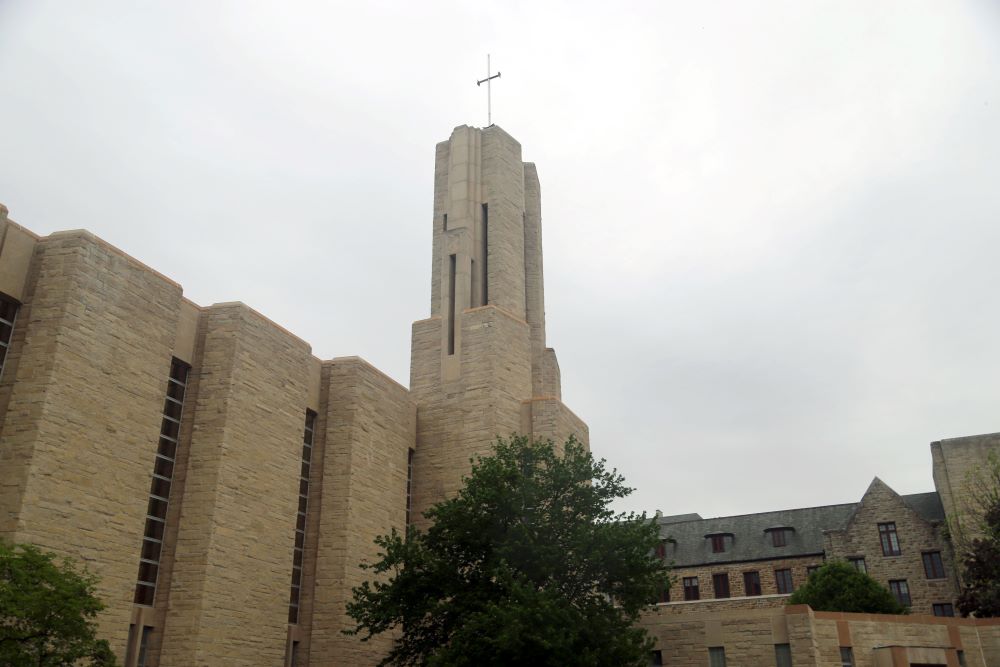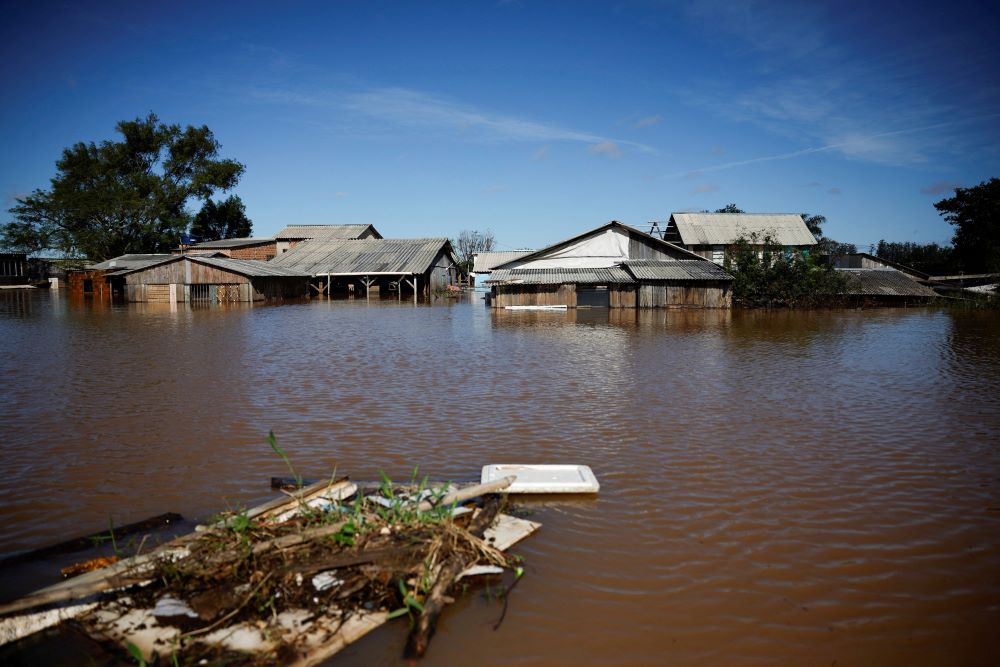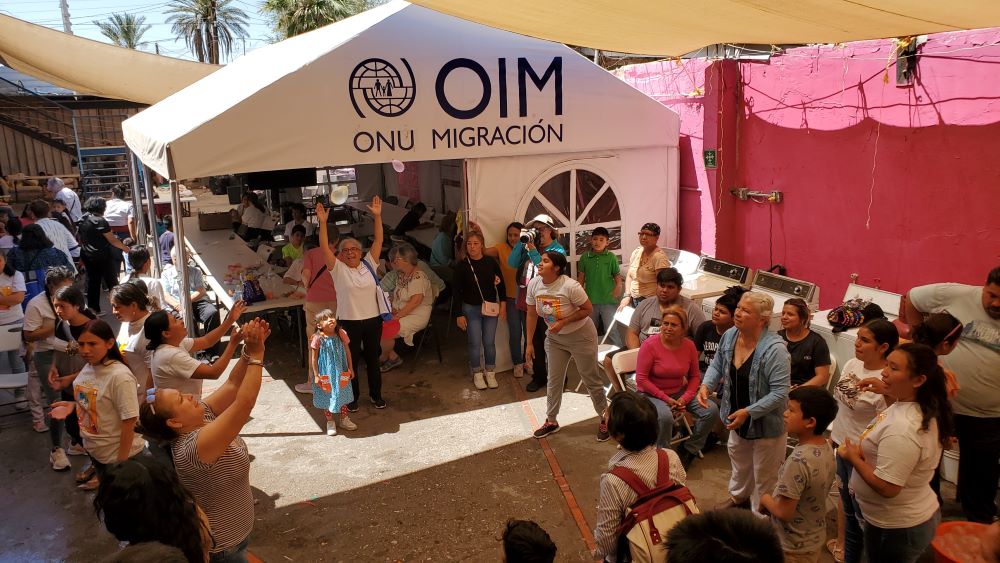
The exterior of St. Benedict's Abbey is pictured in Atchison, Kansas April 25. Benedictine College is sponsored by the monks of St. Benedict’s Abbey and the sisters of Mount St. Scholastica Monastery. (OSV News/Megan Marley)

The Benedictine sisters of Mount St. Scholastica, who co-founded and co-sponsor Benedictine College, have joined the chorus of voices denouncing remarks made by commencement speaker Harrison Butker.
Butker, the kicker for the Kansas City Chiefs football team, gave the commencement address May 11 as 485 students graduated from the liberal arts college in Atchison, Kansas. He started a firestorm of controversy after he said the women graduating should aim not for careers and success, but to be mothers and homemakers.
He noted that his wife gave up her own dream of having a career to instead embrace "one of the most important titles of all: homemaker," and said the women in the graduating class have been misled.
"I want to speak directly to you briefly because I think it is you, the women, who have had the most diabolical lies told to you," he said. Some have pointed that, as Business Insider reported, Butker's mother, Elizabeth Keller Butker, is not a homemaker, but a clinical medical physicist at Emory University School of Medicine.
"How many of you are sitting here now about to cross this stage and are thinking about all the promotions and titles you are going to get in your career?" Butker said at the commencement. "Some of you may go on to lead successful careers in the world, but I would venture to guess that the majority of you are most excited about your marriage and the children you will bring into this world."
A statement on the front page of the Mount St. Scholastica Benedictine's website says Butker's remarks do not "represent the Catholic, Benedictine, liberal arts college that our founders envisioned and in which we have been so invested."
The statement says Benedictine College has been sending women into the world to do great things for decades, both in the home and in the workplace.
"We sisters have dedicated our lives to God and God's people, including the many women whom we have taught and influenced during the past 160 years. These women have made a tremendous difference in the world in their roles as wives and mothers and through their God-given gifts in leadership, scholarship, and their careers," it says.
Advertisement
It goes on to say that while Butker's remarks fostered division, they teach women to reject a narrow vision of Catholicism.
"Our community has taught young women and men not just how to be 'homemakers' in a limited sense, but rather how to make a Gospel-centered, compassionate home within themselves where they can welcome others as Christ, empowering them to be the best versions of themselves," it says.
The Benedictine sisters in 1863 opened a school in Atchison that by 1932 would be a college awarding its first bachelor's degrees. Benedictine monks had opened their own school in Atchison in 1858 and by 1927 it was an accredited liberal arts college. In 1971, the two merged to form Benedictine College, which is a sponsored ministry of both the sisters and the monks.
"We are faithful members of the Catholic Church who embrace and promote the values of the Gospel, St. Benedict, and Vatican II and the teachings of Pope Francis," the statement says. "We want to be known as an inclusive, welcoming community, embracing Benedictine values that have endured for more than 1500 years and have spread through every continent and nation. We believe those values are the core of Benedictine College."

The flooded fishing hamlet of Paqueta in Canoas in Brazil's Rio Grande do Sul state is seen May 14. (OSV News/Reuters/Adriano Machado)
Religious communities in Brazil help victims of historic floods
The largest group of women and men religious in Brazil is raising money to help those affected by flooding in southern Brazil, which has left more than 100 dead and hundreds of thousands displaced.
"The Conference of Religious of Brazil (CRB) expresses its solidarity with those affected by flooding in Rio Grande do Sul," the group said in a May 4 statement.
As of May 15, more than 100 people were reported missing and 600,000 displaced, Associated Press reported. But the number affected, including in neighboring Ecuador, is believed to surpass 2 million.
"At times like these, it is essential that we come together as consecrated religious life in Brazil in solidarity, compassion and generosity to help those most in need," the statement says. 'With sadness we witness the suffering and losses faced by so many families, recognizing the arduous challenge of rebuilding not only homes and infrastructure, but also restoring hope and confidence for better days ahead."
The statement lists the account where donations are being accepted via PIX, a state-owned instant payment system in Brazil. CRB represents more than 30,000 women and men religious in the country.
"Our prayers are with all those who have lost loved ones, homes, livelihoods and are affected in some way by this tragedy," the conference says. "May they find comfort, strength and mutual support to get through this difficult time."
Rainfall in the region has been relentless since late April and early May, causing countless landslides, damaging property, including livestock in agricultural regions, and damaging homes and infrastructure. Some say climate change is to blame, as this year's flooding has resulted in more loss of life and property than last year in the same region, sparking concerns of mass migration caused by catastrophic weather events.
Pope Francis also expressed his solidarity with the region on May 5 and donated more than $100,000 to help.

Sisters of St. Joseph of Carondelet and Orange, California, surprised migrant moms in the Mexican border town of Mexicali May 10, the day that many Latin American countries mark Mother's Day. Sisters and their collaborators spent the day at Cobina Posada del Migrante shelter and took part in activities organized by Border Compassion, a faith-based nonprofit run by St. Joseph of Carondelet Sr. Suzanne Jabro. (Courtesy of Border Compassion)
Sisters celebrate Mother's Day at the border
Sisters of St. Joseph of Carondelet and Orange, California, surprised migrant moms in the Mexican border town of Mexicali May 10, the day that many Latin American countries celebrate Mother's Day.
With gifts, pinatas and food, sisters and their collaborators took the celebration to the Cobina Posada del Migrante shelter, where they shared a meal and helped children make crafts. The activities, organized by Border Compassion, a faith-based nonprofit run by St. Joseph of Carondelet Sr. Suzanne Jabro, brings together communities from both countries to learn about one another as well as immigration issues.
Moms at the shelter received wallets with cash in them as retired Sisters of St. Joseph of Orange helped children make butterflies with coffee filters.
"The monarch butterfly is generally considered the symbol of migration," said Jabro. "Butterflies travel to escape the harsh winters that endanger them by traveling to a safe and warm new home. Their migration has the same purpose as migrants who travel to other countries, in this case, to the United States, searching for a safe and secure home where they can thrive."
The sisters also arrived with mariachis to sing at the shelter. The sisters were living their mission, Jabro said, to "love of God and neighbor without distinction."
"We are called to be wayfinders, edgewalkers, midwives who help with the birthing of the new," Jabro told Global Sisters Report in a May 14 email. "On this day, we were able to use our grandmother energy. We know 'relationship' is the ground of being for Gospel Mission. It is a privilege to be with Mothers from various countries on their journey to a new home. This was a sacred time when strangers became friends. We each returned to the U.S. feeling a shift within our being, grace alive, transformed all of us."
Sisters in conflict zones in DRC
Escalation of violence in Goma, Democratic Republic of Congo, between the M23 rebels and the Congolese military has displaced another 7 million people, according to Firstpost America.
GSR sister liaison Sr. Joyce Meyer reached out to Medicines for Humanity, who contacted Sr. Rose Namulisa Balaluka, who reported a similar situation in April 2023. Balaluka reached out to the sisters in Goma, but they declined to write because they fear for their lives.








